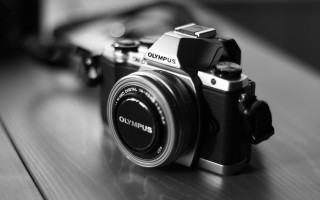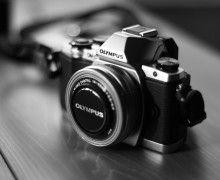Why Doesn’t My Photography Improve: 4 Common Reasons
Most of the times, we look through our photos and notice little improvement in time - it's a wonderful feeling when you realize how far you've come in taking portraits, or how nice your landscapes look nowadays, or how filled with meaning those black and white shots are now.
But what actually happened this time, why do you feel like you're in the same place you were last year or even two years ago photography-wise? There are a couple of reasons - most of them quite common, that need to be taken into consideration in order to solve this so-called mystery.
And to make everything as constructive as possible, each reason will come with a tip or a homework so you can work your way around the status quo in the end.
1. You Don't Take Your Camera Along
If you do not carry around your camera often enough, it is easy to get distracted and forget about improving your photo skills. If you even bother to take a couple of shots occasionally, you should still be able to improve your framing and composition skills.
However, if you do not even bother having your camera with the kit lens attached, when are you going to practice these particular skills? You see, oftentimes people feel the need to carry around their entire equipment bag and it's not always the case - this means that you can often get away with using the 18-55 lens, or 16-85 (depending on whatever kit lens you might have acquired).
The point is, to practice, you don't need any possible lens in your bag - for example, when I don't feel like carrying around everything and just want to have the camera with me, I opt for the 35mm 1.8. This is a comfortable option because it is wide enough to allow me to play with wider scenes, and it also has the 1.8 option if I want to build shallow DOF scenes not to mention that it's incredibly lightweight compared to a zoom lens of any kind.
I captured some wonderful shots in this manner - just because I happened to have the camera with me and the situation had arisen and given me an opportunity to capture something interesting. Not to mention that I managed to apply the golden rule - practice makes perfect. When you think about light, composition, framing and such often enough you realize where the loopholes are, and you become curious in regards to what can be changed about that. And then you start improving.
Homework: If you feel that your camera is too heavy to carry around, and if your time is limited, consider a compact camera. While it is not a great solution in terms of manual settings, you will still get to practice your framing and composition skills. Whenever I leave my camera home, I practice with my iPhone camera, and play around with the little settings it has to obtain a decent result. You can do the same.
2. You're Not Paying Enough Attention
As a photographer, you learn that you have to be incredibly attentive to details, but this involves slowing down - turning down the speed. Just think about it, we pass so many incredible things every day and do not even notice them, because we are too busy being busy to enjoy the general outlook of things.
If you're tied down to a city most of the times, then you have to learn to train your eye to see the extra out of the ordinary because there are a lot of elements out there that are worth capturing. The fact that you are not paying enough attention is a direct consequence of the fact that we live in a loud, noisy world and it is hard to concentrate on the things that matter.
However, it is also a direct consequence of the fact that you do not carry your camera enough - if you would, you would be in photographer mode, and you would pay more attention to things that may or may not have potential, just because you know that's why you grabbed your camera.
As a result, you learn to be less oblivious of the things around you, and in the end you will start slowing down and notice things that you were not used to noticing up until that point. The point isn't to constantly walk slowly looking for the best shot, but to train your mind to see those potential photographs - you already see the frame in your mind, all you have to do is set your camera right and take the shot.
It is a way that involves building photography in your day-to-day life and as it becomes more natural to you, the more you will learn about it.
Homework: Whether you're out with your DSLR or your compact, walk slower and look around you - do you find anything worth shooting? Maybe a building, maybe a pair entangled in romance under an umbrella. You have to stop and look around if you want to see these kinds of things, so take your camera with you and slow down.
3. Frame Paralysis 101
Many people choose to take steps 1 and 2, and carry around their cameras all the time, and are patient enough to observe all those small but relevant things, however are stopped by framing paralysis. The problem is that there is simply something that stops them from taking their cameras out in the street and taking that shot - it is a kind of shyness if you think about it, but it creates a vicious circle.
Most people in this case are worried what the people around them will think about them or what will the people being photographers will think and so on. We all had this small shyness issue in the beginning, but now is a good time as ever to let go of these fears. The key point here is to learn that most of the times, you will never see these people again, and therefore their opinion does not matter anyway.
Homework: Start slowly but surely - It might not be the easiest thing to overcome these fears, but you have to start somewhere. Try taking a picture 2 out of 10 times you feel judged by the people around you, then move the numbers up - take a picture 3 out of 10 times, 4 out of 10 times and so on. Think about it - you don't want your photography skills to lower just because you're too afraid to get your camera out the bag.
4. You Care Too Much For Everybody Else's Opinion
This goes well with the previous reason - one of the most interesting reason for which people stop taking photographs is that they feel unappreciated, meaning that not enough people appreciate their results. The best attitude here is to stop trying to convince everyone that your photography is great - not everybody has to love your photography.
This is one of the worst approaches to success and recognition since it will either turn you into someone that does not care for photography altogether and will end up not practicing it often enough, or simply it will turn you into someone that does common shots everybody enjoys seeing for this particular reason.
Take a leap of faith, photograph the things you like to, in your own way - learn from your mistakes, become better at it, and stop worrying whether the entire world will love it or not.


